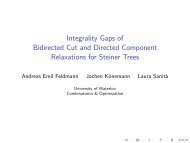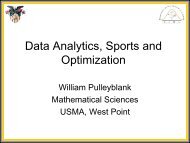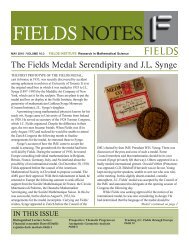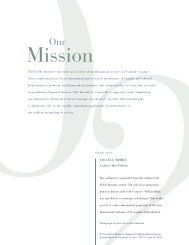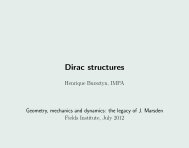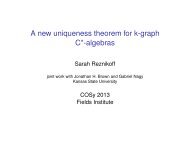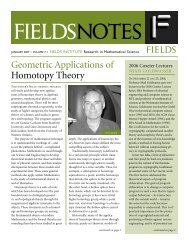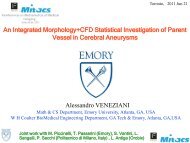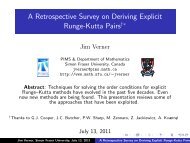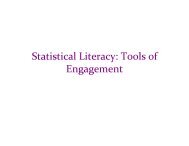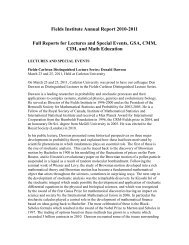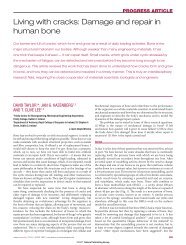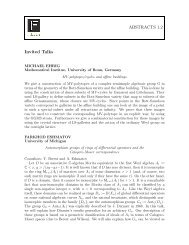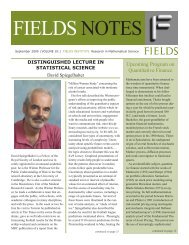Annual Report 2005 - Fields Institute - University of Toronto
Annual Report 2005 - Fields Institute - University of Toronto
Annual Report 2005 - Fields Institute - University of Toronto
Create successful ePaper yourself
Turn your PDF publications into a flip-book with our unique Google optimized e-Paper software.
Kuznetsov, he models each firm using a Markov chain, with<br />
the dependence between firms arising from a stochastic<br />
time change. This gives a parsimonious but flexible model<br />
in which computations can be carried out rapidly and<br />
efficiently.<br />
Robert Almgren, who administers the Computational<br />
Finance program at the <strong>University</strong> <strong>of</strong> <strong>Toronto</strong>, gave the<br />
seminar in March. In many cases, only imprecise information<br />
is available about the expected performance <strong>of</strong> firms.<br />
Almgren showed how to build optimal portfolios based<br />
only on qualitative information about the ranking <strong>of</strong> firms<br />
relative to each other. He presented data, showing striking<br />
improvements in performance <strong>of</strong> such algorithms over<br />
naive portfolio selection strategies.<br />
Finishing the year was Didier Sornette, Pr<strong>of</strong>essor <strong>of</strong> Geophysics<br />
at UCLA, and bestselling author <strong>of</strong> the book Why<br />
Stock Markets Crash. He spoke about extreme financial<br />
risks, the topic <strong>of</strong> his forthcoming book with Y. Malevergne.<br />
While the distribution <strong>of</strong> individual returns for<br />
stocks or commodities is well understood, the dependencies<br />
between several such stocks or commodities are not. In particular,<br />
traditional modeling using Gaussian copulas <strong>of</strong>ten<br />
breaks down when price movements are extreme. Sornette<br />
discussed when such models are appropriate, and some<br />
alternatives that can replace traditional models when the<br />
latter break down. He drew interesting parallels between<br />
financial problems, and recent successes in the modeling<br />
and prediction <strong>of</strong> earthquakes and extreme meteorological<br />
events.<br />
The seminar is sponsored by the <strong>Fields</strong> <strong>Institute</strong> and by<br />
MITACS. It meets the last Wednesday evening <strong>of</strong> each<br />
month, combining one or two talks with informal discussion<br />
and a small reception.<br />
Speakers:<br />
Robert Almgren (<strong>Toronto</strong>)<br />
Optimal portfolios from ordering information<br />
David Hobson (Bath)<br />
Local martingales and option prices<br />
Tom Hurd (McMaster)<br />
Fast CDO pricing in an affine Markov chain model <strong>of</strong> credit<br />
risk<br />
Mark Kamstra (Schulich School <strong>of</strong> Business, York)<br />
Investing confidence in the Ex Ante Equity Premium: a new<br />
methodology and a narrower range <strong>of</strong> estimates<br />
C o m m e r c i a l / I n d u s t r i a l M a t h e m a t i c s<br />
Stanley R. Pliska (Illinois at Chicago)<br />
Optimal mortgage refinancing with endogenous mortgage<br />
rates: an intensity based, equilibrium approach<br />
Luis A. Seco (Risklab & <strong>Toronto</strong>)<br />
Pricing default correlation products within a structural<br />
framework<br />
Didier Sornette (UCLA)<br />
Extreme financial risks<br />
Industrial Optimization Seminars<br />
November 2004 – May <strong>2005</strong><br />
Held at the <strong>Fields</strong> <strong>Institute</strong><br />
Organizers: Natalia Alexandrov (NASA), Andrew R. Conn<br />
(IBM Watson), Ron Dembo (0footprint), John E. Dennis<br />
(Rice), Stefan Karisch (Carmen Systems), Barbara Lee<br />
Keyfitz (<strong>Fields</strong>), Tamás Terlaky, (McMaster, Chair) and<br />
Margaret H. Wright (NYU)<br />
The <strong>Fields</strong> Industrial Optimization Seminar series has<br />
completed its first year. The series <strong>of</strong>fers two one-hour long<br />
seminars at 5pm on the first Tuesday <strong>of</strong> each month by<br />
leading experts on a topic in optimization; the first speaker<br />
is a theoretical/algorithmic expert from a university or a<br />
research lab, while the second speaker will come from engineering,<br />
the private or government sectors, and will present<br />
the needs and uses <strong>of</strong> theoretical/algorithmic achievements<br />
in engineering practice or industry. This approach brings to<br />
the fore the power and importance <strong>of</strong> mathematical optimization<br />
methods that enable engineers and practitioners<br />
to solve industrial problems efficiently.<br />
The organizers’ aim is to facilitate communication, collaboration<br />
and synergy between the mathematical, engineering<br />
and industrial optimization communities, and to trigger<br />
the use and development <strong>of</strong> novel optimization methods.<br />
Optimization Seminar organizers and participants<br />
<strong>Fields</strong> <strong>Institute</strong> <strong>2005</strong> ANNUAL REPORT 111



